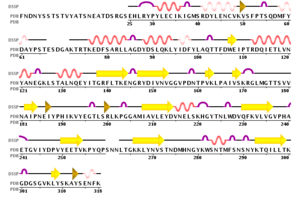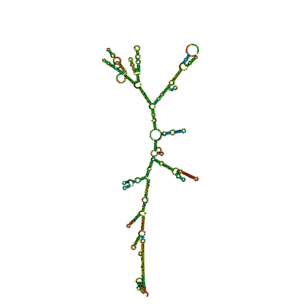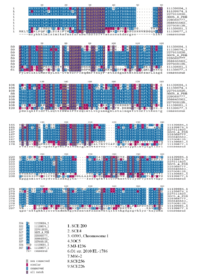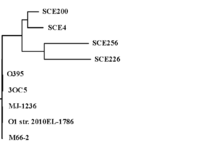We apologize for Proteopedia being slow to respond. For the past two years, a new implementation of Proteopedia has been being built. Soon, it will replace this 18-year old system. All existing content will be moved to the new system at a date that will be announced here.
Vibrio cholerae colonization factor TcpF
From Proteopedia
(Difference between revisions)
| Line 1: | Line 1: | ||
| - | + | <StructureSection load='3oc5' size='400' side='right' scene='Vibrio_cholerae_colonization_factor_TcpF/Rainbow/1' caption='Cholera colonization factor [[3oc5]]'> | |
| - | + | ||
| Line 22: | Line 21: | ||
== Function == | == Function == | ||
| - | + | ||
The function of many of Tcp genes and their associated proteins are largely unknown. TcpF is the only protein secreted by the TCP apparatus and it represents the first nonpilus protein identified that is specifically secreted outside the bacterial cell by a type IV pilus biogenesis apparatus.<ref name="map" /> Studies hypothesize that TcpF, identified in classical isolates of V. cholerae O1 is an essential factor for colonization in the infant mouse cholera model. Bacteria lacking tcpF are deficient in colonization, and anti-TcpF antibodies are protective in the infant mouse cholera model. TcpF is expressed in vivo during human infection and generates a substantial immune response in patients infected with V. cholera. By looking at the homology of TcpF, the NTD and the CTD together form a unique interface that interacts with partner proteins to function in V. cholerae colonization.<ref>TcpF Is a Soluble Colonization Factor and Protective Antigen Secreted by El Tor and Classical O1 and O139 Vibrio cholerae Serogroups Thomas J. Kirn and Ronald K. Taylor [http://iai.asm.org/content/73/8/4461 DOI: 10.1128/IAI.73.8.4461-4470.2005] Infect. Immun. August 2005 vol. 73 no. 8 4461-4470.</ref> | The function of many of Tcp genes and their associated proteins are largely unknown. TcpF is the only protein secreted by the TCP apparatus and it represents the first nonpilus protein identified that is specifically secreted outside the bacterial cell by a type IV pilus biogenesis apparatus.<ref name="map" /> Studies hypothesize that TcpF, identified in classical isolates of V. cholerae O1 is an essential factor for colonization in the infant mouse cholera model. Bacteria lacking tcpF are deficient in colonization, and anti-TcpF antibodies are protective in the infant mouse cholera model. TcpF is expressed in vivo during human infection and generates a substantial immune response in patients infected with V. cholera. By looking at the homology of TcpF, the NTD and the CTD together form a unique interface that interacts with partner proteins to function in V. cholerae colonization.<ref>TcpF Is a Soluble Colonization Factor and Protective Antigen Secreted by El Tor and Classical O1 and O139 Vibrio cholerae Serogroups Thomas J. Kirn and Ronald K. Taylor [http://iai.asm.org/content/73/8/4461 DOI: 10.1128/IAI.73.8.4461-4470.2005] Infect. Immun. August 2005 vol. 73 no. 8 4461-4470.</ref> | ||
Revision as of 12:40, 15 January 2015
| |||||||||||




